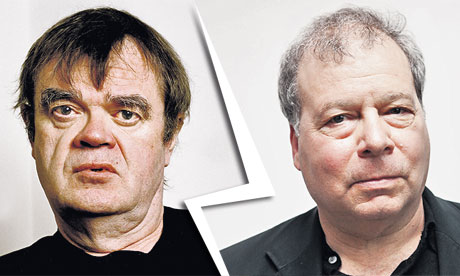 |
| Earl the Squirrel's Rule #17 |
We begin by examining the nature and value of originality. This may be the least significant of the twelve aspects of poetry we'll examine but, as anyone falling from great height can attest, gravity dramatically affects all of our lives despite being among the weakest forces in physics.
There are three conceivable approaches to novelty:
1. NNUTS - The Nothing New Under The Sun school punts the issue. These prosodists trace the influences of poets and poems, apparently hoping to prove that no one has had an original thought since cave dwellers moved into huts. For example, Tony French and others have shown that so many lines of John Gillespie Magee's "High Flight" were lifted from other sources that it could be considered a cento. That doesn't change the fact that it is one of the two best known and best loved poems of the 20th century. The cliché collage is the most visible product of the NNUTS view.
You want your words to survive their telling. Given that recognition is the goal why should incorporating the familiar into the process be such a crime?
In short, these people don't sweat originality or content at all. The hypothesis is that if you write well you'll be different enough. To NNUTS advocates, a poem is "a little machine for remembering itself", as Don Paterson said. This makes them good critics, critiquers and teachers but, because they insist that aspiring poets should take time to learn the elements of the craft, NNUTS proponents do not exert much influence within the lazy majority.
For what it's worth, their patron saint is Algernon Charles Swinburne.
As an aside, let me say that it is difficult to find anything weighty or fascinating to say on a regular basis. If you doubt this, try blogging for a year or so. We have to regard Edgar Guest with at least grudging admiration; he wrote and published verse every day for thirty years! Granted, it was insipid dreck, but in being metrically sound it showed familiarity with at least one more aspect of the art form than most of today's MIN "poets" can demonstrate.
By definition, a cliché is trite, something everyone understands because they've seen it many times before. The polar opposite of the clichéd/trite is not the new but the incoherent (i.e. that which no one comprehends). Thus, we have postmodernism.
It is difficult to imagine a role for MIN types. In practice, they dominate "theoretical" discussions among Content Regents who think WCW's "The Red Wheelbarrow" is free verse.
3. Good Stories Well Told ("GoStWeTo") - Is it really too much to ask that poets have something interesting¹ to say and know the difference between trochees and iambs?
Footnotes
¹ - "Interesting" does not necessarily imply "profound". It can mean, among many other possibilities, "informative", "funny", "entertaining" or "moving". That I feel the need to explain the term speaks volumes.
Links:
- 12 Things Poets Get Backwards - Part I
- 12 Things Poets Get Backwards - Part II
- 12 Things Poets Get Backwards - Part III
- 12 Things Poets Get Backwards - Part IV
- 12 Things Poets Get Backwards - Part V
- 12 Things Poets Get Backwards - Part VI
- 12 Things Poets Get Backwards - Part VII
- 12 Things Poets Get Backwards - Part VIII
- 12 Things Poets Get Backwards - Part IX
- 12 Things Poets Get Backwards - Part X
- 12 Things Poets Get Backwards - Part XI
- 12 Things Poets Get Backwards - Part XII
Your feedback is appreciated!
Please take a moment to comment or ask questions below or, failing that, mark the post as "funny", "interesting", "silly" or "dull". Also, feel free to expand this conversation by linking to it on Twitter or Facebook. Please let us know if you've included us on your blogroll so that we can reciprocate.
If you would like to contact us confidentially or blog here as "Gray for a Day" please use the box below, marking your post as "Private" and including your email address; the moderator will bring your post to our attention and prevent it from appearing publicly.
We look forward to hearing from you.
Signed,
Earl Gray, Esquirrel





